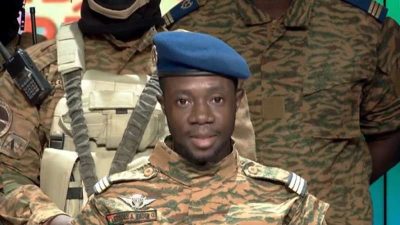Burkina Faso: Aid cuts possible after coup – US ambassador
Burkina Faso’s coup leaders have yet to say if they will install a civilian or military leader after deposing President Roch Kaboré, who has since resigned formally.
In an interview with VOA, U.S. Ambassador to Burkina Faso Sandra Clark says if the military installs its own leader, Washington could cut support to Burkina Faso.
In the interview, Ambassador Clark said the United States is closely monitoring the situation.
“We are evaluating events on the ground for any impact on our assistance. This is a very fluid situation and things are evolving. I would note that U.S. law does require a review and possible suspension of assistance in cases where a democratic government is deposed by unconstitutional means,” she told VOA.
The junta has yet to announce whether it plans to install a military or a civilian president as the new ruler. If a civilian is selected, it may mean a continuation of support from the United States, which has provided counterterrorism training to Burkinabe troops, as well as funding.
Ambassador Clark says the U.S. would like to see democratic rule restored.
“We have called for the immediate release of President Kaboré and other government officials and for a return to civilian-led government and constitutional order, and we urge all sides to remain calm and seek dialogue to address grievances,” she expressed.
Burkina Faso has been locked in a six-year conflict with armed groups linked to Islamic State, al-Qaida and local bandits. The military has suffered a string of significant defeats to the groups in recent months.
France also has a special forces unit stationed in the country and provides air and intelligence support to the Burkinabe military.
Meanwhile, there is widespread agreement among Burkinabes that the status quo with the country’s current military partners needs to change.
More than 1,000 people attended a demonstration Tuesday in the capital, Ouagadougou. Speakers called for Russian military support, which has occurred in neighboring Mali in recent weeks.
Alexander Ivanov, the official representative of Russian military trainers in the Central African Republic, issued a statement offering training to the Burkinabe military on Tuesday.
Analyst Andrew Lebovich, with the European Council on Foreign Relations, was asked by VOA why support for Russian intervention is growing.
“As anti-French sentiment has grown, as skepticism has grown and as people have grown concerned and frustrated with the security situation, that blame has fallen, unfairly or not, on the traditional partners, on the current partners,” he responded.
There has been no further word on the whereabouts of former President Kaboré, whom the military arrested on Monday.


